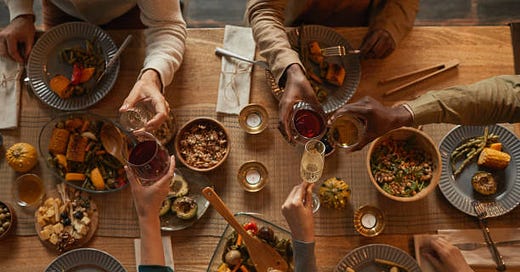Ways to Cope with Stress Around the Holidays
The holiday season may be a time of joyful moments and cheerful memories, but it can also be stressful or painful for many. Whether it's family dynamics, holiday planning, or difficult conversation topics at the dinner table, you’re not alone in feeling stress during this time of year. While everyone’s experience is different, here are some common sources of seasonal stress and ways to cope with each.
Family Dynamics
If you are spending the holidays with family, it’s normal for stressful dynamics to arise.
How to Cope
It takes all participants to keep family dynamics going. You can disrupt the pattern by choosing differently from your typical role. I’d recommend thinking ahead about when you tend to feel irritable or resentful. Ask yourself: what do I need in these moments? Setting a boundary can look like taking space, changing the subject, not responding, or giving less information. In addition, there’s power in acceptance. We usually know who does not understand us, yet we often keep trying. Accepting what is and what doesn’t change and will not change at a large gathering – this can be empowering.
Expectations
From hosting, planning, and gift giving, to socializing, decorating, and cooking, the pressure to live up to expectations can be overwhelming. This includes financial pressures.
How to Cope
Give yourself grace and compassion. Make sure your expectations of yourself are realistic and fair. If they aren’t, try to explore how you can break down tasks. Take breaks and take care of yourself. Planning ahead and prioritizing can also reduce the stress of holiday planning.
Grief and Loss
The holiday season can highlight feelings of grief if you’ve lost a loved one. It’s normal to experience a range of feelings: sadness, anger, depression, and more. It’s normal that the holidays bring back memories with this person – which can bring both warmth and heartache. You may also be grieving the fact that holidays feel different than they used to.
How to Cope
Remember that grief is a form of love. Let yourself feel. Be patient with yourself. Lean into your loved ones. Meet yourself where you are at and give yourself what you need – talking about this loved one, participating in traditions, taking breaks, crying, etc.
Food and Alcohol
Many holiday traditions are centered around eating and drinking. This can be triggering for those struggling with eating disorders and addiction.
How to Cope
Stay in tune with your feelings and speak to your therapist about coping skills. Remember the power of choice and count your small wins.
Loneliness
The holiday season can highlight feelings of disconnect or distance from others.
How to Cope
Loneliness is a universal feeling and you’re not alone in feeling it. Try to be curious about your loneliness. What maintains it? When do you feel a little less lonely? With whom do you feel connected? Is there a small forward step you can take to connect with others in your life?
Catching Up, Life Updates, & End of Year Reflection
We tend to put pressure on ourselves as we reflect on the year and set new goals. We also may experience pressure from loved ones.
How to Cope
First, don’t measure yourself by someone else’s ruler. You can ask yourself, "Am I feeling pressure to live up to others’ expectations? If so, are these expectations aligned with my values?" Second, don’t look at the year with a black-and-white report card mentality. Instead ask yourself, "What were highlights? What were challenges? What did I endure and overcome? What did I learn about myself? As I’m reflecting, what am I proud of?" Third, remember that you don’t have to have it all figured out yet. Instead ask yourself, "What are some small realistic goals I can set that bring me a step forward?"
“Loving ourselves means that we know we have a right to our boundaries no matter what they are and no matter what anyone else wants.” - Nancy Levin
The most important takeaway is to be kind to yourself.
If you enjoyed reading this article, please share and subscribe.




